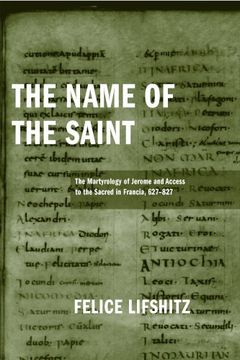The Name of the Saint: The Martyrology of Jerome and Access to the Sacred in Francia, 627-827 (Publications in Medieval Studies) (en Inglés)
Reseña del libro "The Name of the Saint: The Martyrology of Jerome and Access to the Sacred in Francia, 627-827 (Publications in Medieval Studies) (en Inglés)"
"There is perhaps no more horrible book in all of antiquity." So wrote the Bollandist, Victor de Buck, in 1875, concerning the Martyrology of Jerome. Attributed by its pseudonymous author to the eminent Christian scholar, St. Jerome (d. 430), it is universally recognized as apocryphal, yet frequently treated as a serious artifact of late ancient Christianity. The mystique of the text—the oldest extant martyrology, from which all others descend—has benefited from the highly technical stylistic conventions of liturgical scholarship, which can render liturgical studies all but impenetrable to outsiders. Both martyrologies and calendars have been virtually ignored by non-liturgists despite the importance of such documents to medieval life and the insights which their exploration can yield. The Name of the Saint addresses these martyrological and calendrical materials in a manner accessible to non-liturgists. It is a study of the spiritual, social, and liturgical practices of reciting, inscribing, collecting, and bearing saints’ names from the seventh through the ninth centuries. These practices, called in manuscript sources the sanctorum nominum festivitas, were extremely rare among Christians during the early middle ages, when most people preferred to access the realm of sacred power through other routes, such as the relics, images, and life stories of saints. Felice Lifshitz’s study, based on careful analysis of manuscript martyrologies, sacramentaries, and calendars, reveals that those individuals who did embrace name-centered piety (such as Willibrord-Clement of Echternach and Witiza-Benedict of Aniane) had in common both close connections with the Carolingian family and a familiarity with the Martyrology of Jerome. Lifshitz's discussion of these neglected materials reveals the existence of alternative and under-appreciated routes of access to the sacred. It also situates the rise of these alternative practices in a particular political context and elucidates the history of the widely misunderstood Martyrology of Jerome. Medievalists will welcome this new way of thinking about early medieval spirituality and the place of saints and sanctity within that spirituality."Felice Lifshitz’s discussion is an original and valuable contribution to the history of the liturgy and the cult of saints in the early middle ages." —Walter Goffart, University of Toronto "In The Name of the Saint, Felice Lifshitz has taken an enigmatic and neglected text—the martyrology attributed to Jerome—and asks the intriguing questions: Why was the martyrology composed? Why was it recopied in particular places, at particular times? and Why did the manuscripts differ from one another, particularly in format? Her investigation leads her to reinterpret a wide range of sources and events—liturgical, legal, palaeographical, political, and ecclesiastical—all in the service of an original and stimulating thesis." —John McCulloh, Kansas State University

